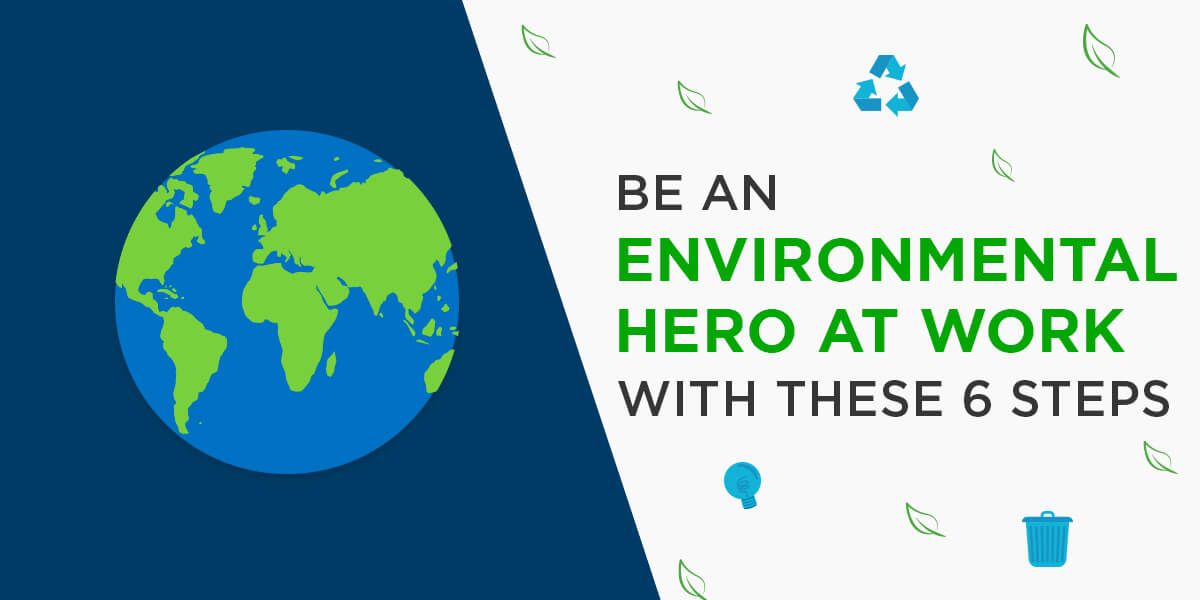Be an Environmental Hero at Work with These 6 Steps

With great power comes great responsibility, and we all have the power to reduce waste. We’re responsible for making most of it, after all.
For World Environment Day on June 5th, we’re encouraging you to practice sustainable habits.
What does it mean to live sustainably?
Sustainable living means using as few resources as possible and causing the least amount of environmental damage for future generations.
It can be tough to be conscious of how harmful habits and everyday objects can be to our environment.
Before a product even reaches the store and we purchase, use, and later discard it, an incredible amount of resources is expended to make it. Aside from harmful waste, there is also widespread unfair labor practices around the globe. While we don’t expect to stop this overnight, one way to prevent this abuse is by not supporting these businesses.
Certainly, these businesses don’t care to be recognized as unsafe or unethical. Letting people know that they are will (hopefully) lead consumers to demand a different standard of service.
But sustainable living is about more than just purchasing all the reusable straws. It’s about managing with what you’ve got on hand and making it last as long as possible. That means mending your broken things instead of purchasing brand new ones. And if there’s something that you don’t have yet, consider buying second-hand or pre-loved items or trading with friends.
Now that you have an idea about the basics of sustainability, how do you apply these habits at work?
How you can be an Environmental Hero at work?
It can be intimidating when you first start learning how to actually save the environment. You’ll discover that it takes more than just one signature on an online petition. That’s why we have to take steps, no matter how small, to improve the quality of our environment.
Every step you take, no matter how small…
Here are a few steps that you can start with:
Walk, bike or ride public transport.

There’s no contesting the fact that riding your car to work is the most comfortable option. There’s air conditioning, you can listen to your favorite audio, and other people won’t be pushing or shoving you. However, you can’t argue with the fact that it’s not very good for the environment.
Squeeze in an exercise with a walk or a bike ride on your way to work to be healthier, which is also kinder to the environment since you don’t need to gas up. If your workplace is a distance away from your house, public transportation is the way to go. You can also carpool with your coworkers if possible!
If you have the option to work from home, forgo the everyday commute altogether! You might be surprised how much you can save when you don’t have to pay for fares, gas or eating out.
Remember to segregate.

Segregating is the prerequisite to recycling and repurposing. Once you’ve sorted which items fall in these two categories, you might find that you have less to throw away.
Start with plastic bottles and paper products. Both of these can be recycled and repurposed. The same goes for old clothing and other fabrics. If they’re not in a condition for selling or donating, repurpose them into cleaning cloths.
Take your segregating skills a step further and learn about composting.
Interested in doing more? Look for ways to compound non-biodegradable materials into something useful or something less harmful. With something like ecobricking, you repurpose small bits of plastic into reusable building blocks by stuffing them in plastic bottles. Now, you have an alternative to cement bricks.
Reusables are your friends.

Have you noticed how often you reach for disposable items? Need to clean something in a jiffy? You look for a tissue or a wet wipe (no, they are never “flushable”). Finished with your fast-food meal? Now, you have plastic utensils to dispose of.
Ideally, your go-to items should be reusable. These can be something as simple as your water bottle, your food containers, and your eating utensils. And no, there’s no need to buy new ones. Chances are you have these tucked away somewhere at home. It’s their time to shine.
Kudos to you if you’re the sort of person who brings lunch to work. When this isn’t an option, you can still bring your lunch box and ask your local food place to use your personal items instead of their disposable ones. Your new mantra should now be “reuse, reuse, reuse!”
Go meatless for a day (or every day!)

The production of meat and dairy is one of the leading sources of carbon emissions. Using more resources than we should is sure to be bad for us in the long run.
A simple step you can take to reduce your carbon footprint is going meatless for a day. Visit your local farmer’s market and check out their fresh fruits and veggies. You’ll be helping out small businesses and keeping a balanced diet.
Digitize your workflow.

Working online and via the cloud not only contributes to using less paper but also speeds things up in terms of ideation and execution. Other than email and messaging apps, work tools are being built with collaboration and productivity in mind. Remote teams are trending now, after all.
Employ the cloud for your documents, send invoices via email, and manage your tasks online. Cut down paper-use at the office and give yourself a pat on the back.
Partner with environmental organizations.

Environmental hero work isn’t a one-person occupation. It takes people with a purpose to create substantial change. Reach out to local organizations that endeavor to make the world a better place.
You can start with workshops to educate your community at work to spread the word. Host a beach clean up for your team building exercise. Participate in a fun run for the environment.
What’s the next step?
Once you’ve started a habit, the next step is always to try and keep it up. It is a conscious effort to motivate yourself. You can only be as committed to being an environment hero as you are interested in being one.
Get in the habit of declining plastic products and bringing an eco-bag or a tote wherever you go. Establish a point system for reducing, reusing and recycling. Start a collection bin for donating pre-loved items. Resell plastic and paper products to earn funding for a good cause. Make a game out of repurposing things or turn them into art. And if you find a way to turn trash into reusable energy, we’d love to hear from you.